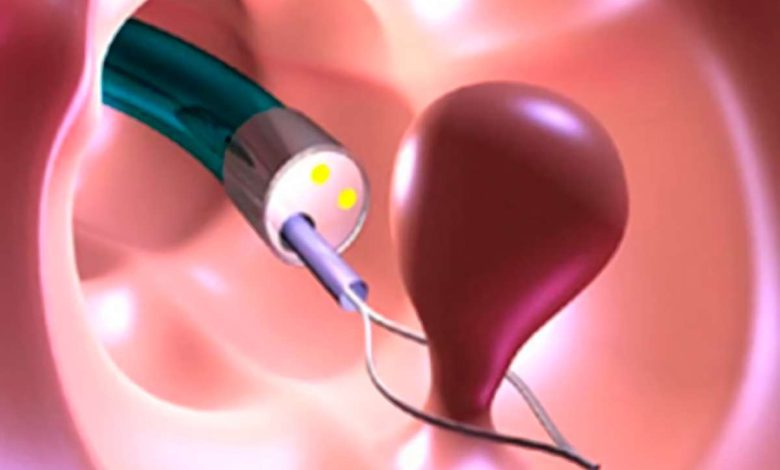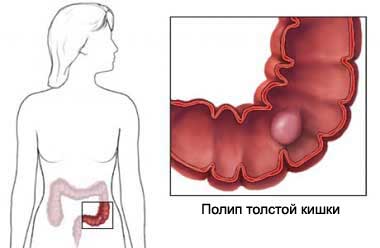Removal of colon polyps: what is this operation, causes, Contraindications, how they do it, what after

Description removal of colon polyps
Polypectomy of the colon – removal of polyps from the inside lining of the colon. Polyps of the colon These are growths from body tissue.. Some types of polyps can turn into cancer.. Most polyps can be removed during a colonoscopy or sigmoidoscopy.

Reasons for removal of colon polyps
The goal of surgery is to remove a polyp. This is done to prevent cancer.
In rare cases, larger polyps can cause painful symptoms, such as rectal bleeding, abdominal pain and bowel disorders. Polyp removal will relieve these symptoms.
Possible complications in removing colon polyps
Complications are rare, but no procedure does not guarantee the absence of risk. Before, how to perform the removal of polyps, you need to know about possible complications, which may include:
- Damage to the colon wall;
- Bleeding;
- Infection;
- Adverse reaction to the sedative.
Factors, that may increase the risk of complications include:
- Smoking;
- Type, the size and location of the polyp;
- Disorders of blood clotting, substance abuse, or other diseases (eg, obesity, diabetes).
How is the removal of colon polyps?
Preparation for the procedure
Before the procedure the doctor, probably, appoint the following:
- Physical examination;
- Revision of the medication;
- Check stool for occult blood;
- Roentgen – test, which uses a small amount of radiation, to take pictures of structures inside the body;
- Barium enema – X-ray test, wherein the contrast agent is used, to make pictures of the colon;
- Diagnostic colonoscopy or sigmoidoscopy – study interior of the intestine using an endoscope.
The colon must be completely cleaned before the procedure. Any chair, which remains in the intestine will block the field of view. This preparation may start several days before the procedure,. Methods for purification may include:
- Enema – fluid is introduced into the rectum, to stimulate defecation;
- Laxatives – medicines, that cause soft stool;
- We need to take a clear liquid diet;
- Receive a large amount of liquid to stimulate defecation.
In the run-up to the procedure:
- The patient may be asked to stop taking certain medicines a week before the procedure,:
- Anti-inflammatory drugs (eg, aspirin);
- Blood thinners, such as clopidogrel or warfarin;
- Additives or vitamins, containing iron.
- The night before, you can eat a light meal. Do not eat or drink after midnight before surgery;
- If you have diabetes, you need to consult a doctor, if you need to take a dose of insulin;
- It is necessary to arrange a ride home after the procedure.
Anesthesia
The patient receives a sedative. It will help to relax. It will be a feeling of drowsiness, but the patient does not fall asleep.
Procedure removal of colon polyps
The patient will be asked to lie on your side or on your back. The endoscope is a long flexible tube with a camera on the end is inserted through the anus. It will be slowly pushed through the rectum into the colon. After the unit is supplied air, to open a colon.
Using the camera, the doctor finds a polyp. The polyp will be cut special tool. In some cases, polyps can be destroyed by the electric current. Electrical current is also used, to close the wound and stop the bleeding. The polyps are sent to a lab for study. When the doctor finished the operation, Tools slowly extracted from the intestine.
For larger polyps may be necessary laparoscopic surgical procedures. Specific surgical instruments will be inserted through a small incision in the abdominal cavity and used to detect and remove the polyp.
How long will the removal of colon polyps?
30-60 minutes
Will it hurt?
Special cleaning solution, laxatives, and / or enemas often cause discomfort. During and after the procedure is usually no pain. The patient may feel pressure, abdominal distention, and / or convulsions due to pumping air into the colon. This discomfort will disappear after the gas. Your doctor may prescribe pain medicine to relieve discomfort.
Caring for a patient after removal of colon polyps
Care in a hospital
The polyps will be sent to a lab for study.
Home Care
Complete recovery usually takes about two weeks. To ensure proper recovery, be sure to follow your doctor's instructions, which may include:
- You can not sit behind the wheel, operate machinery, or make important decisions the day of the procedure, until the end of sedative effect;
- You can return to your normal diet the next day. We should avoid drinking coffee, tea, carbonated drinks, alcohol and spicy food to take at least 2-3 day after surgery, because it can cause irritation of the digestive system;
- You can return to normal activities, as to improve the condition. Most people feel well enough the next day;
- We need to ask your doctor about, when it is safe to shower, bathe, or to expose the surgical site to water;
- In the future, you want to schedule a colonoscopy periodically. It is important to check the recurrence of polyps;
- The doctor will discuss the results of the procedure on the day of surgery or the next day.
Contact your doctor after removal of colon polyps
After discharge from the hospital need to see a doctor, If the following symptoms:
- Signs of infection, including fever and chills;
- Redness, edema, increased pain, bleeding or discharge from the rectum (to 150 mL of blood per day can be expected within 3-4 days after polypectomy);
- Black, tarry stools;
- Severe abdominal pain;
- Constipation;
- Failure to pass gas or stool;
- Cough, breathlessness, chest pain, or severe nausea or vomiting;
- Other painful symptoms.
